人教新目标版英语七年级上Unit 5 Do you have a soccer ball?SectionA 2d-3c课件+嵌入音频(29张PPT)
文档属性
| 名称 | 人教新目标版英语七年级上Unit 5 Do you have a soccer ball?SectionA 2d-3c课件+嵌入音频(29张PPT) | 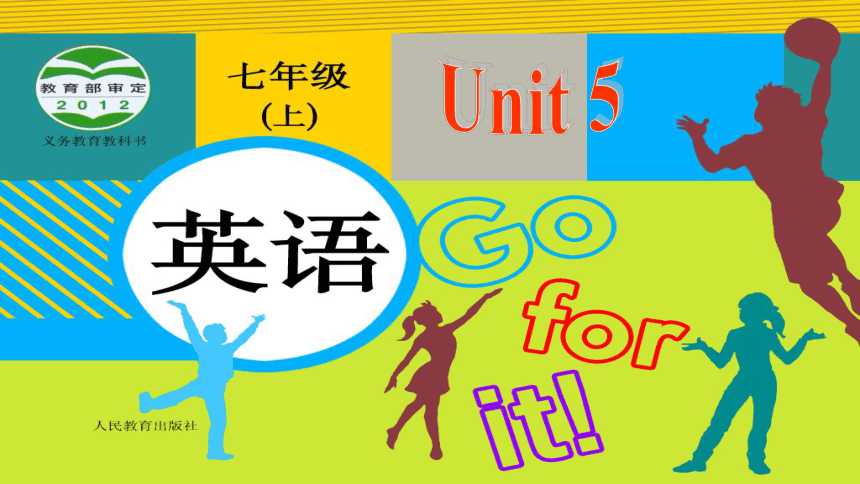 | |
| 格式 | zip | ||
| 文件大小 | 3.4MB | ||
| 资源类型 | 教案 | ||
| 版本资源 | 人教新目标(Go for it)版 | ||
| 科目 | 英语 | ||
| 更新时间 | 2020-11-05 07:36:16 | ||
图片预览

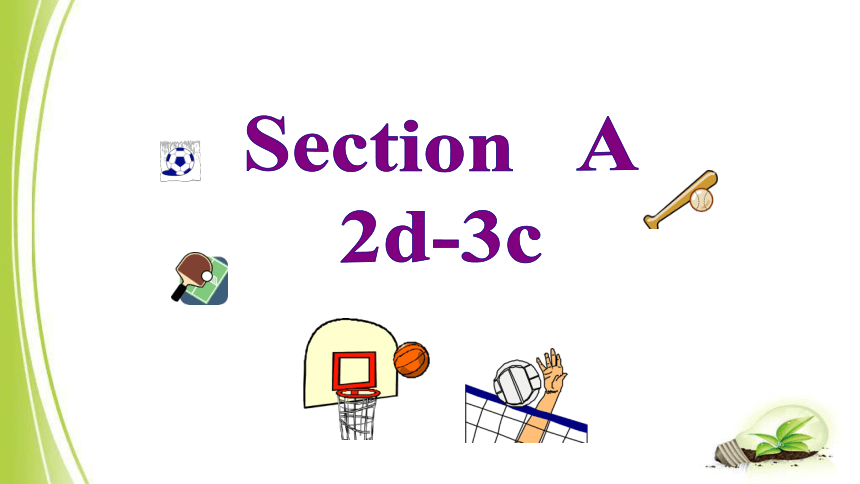
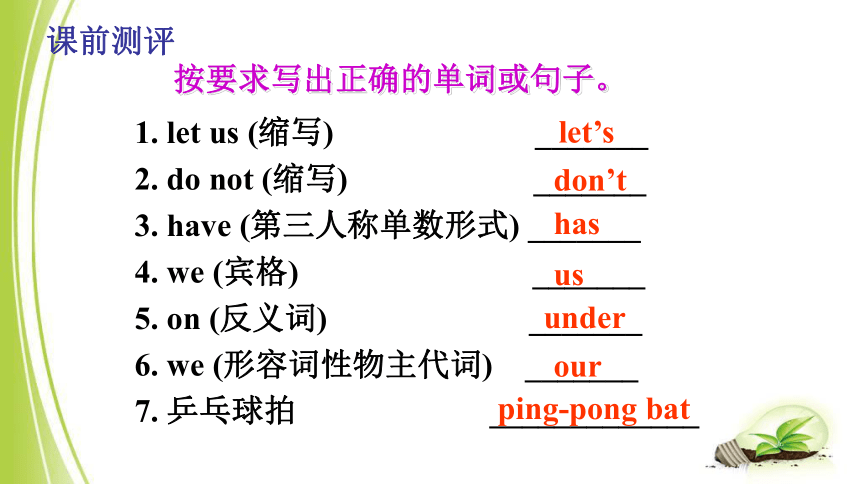

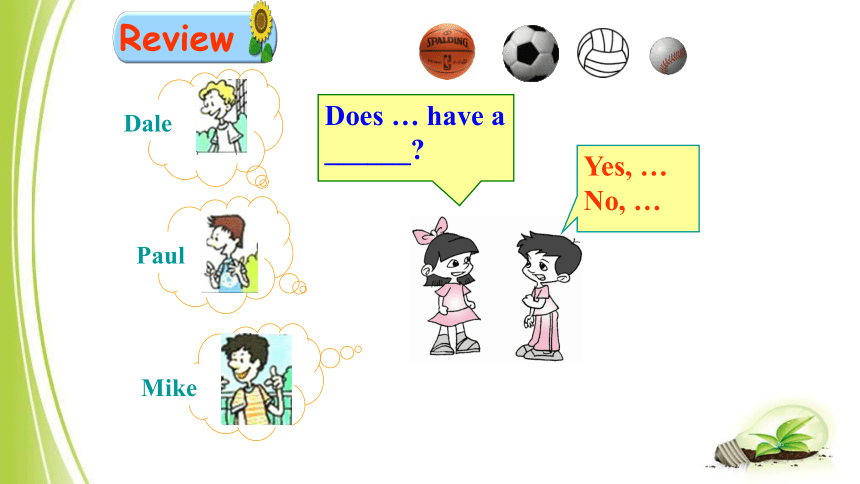
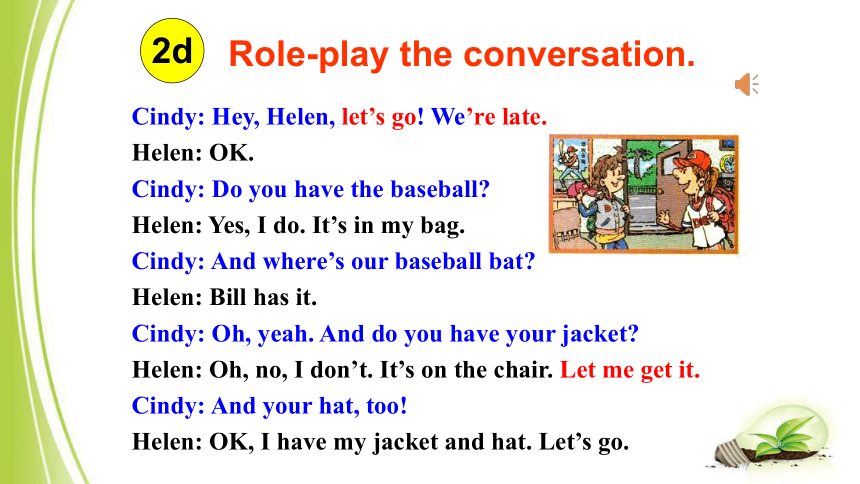
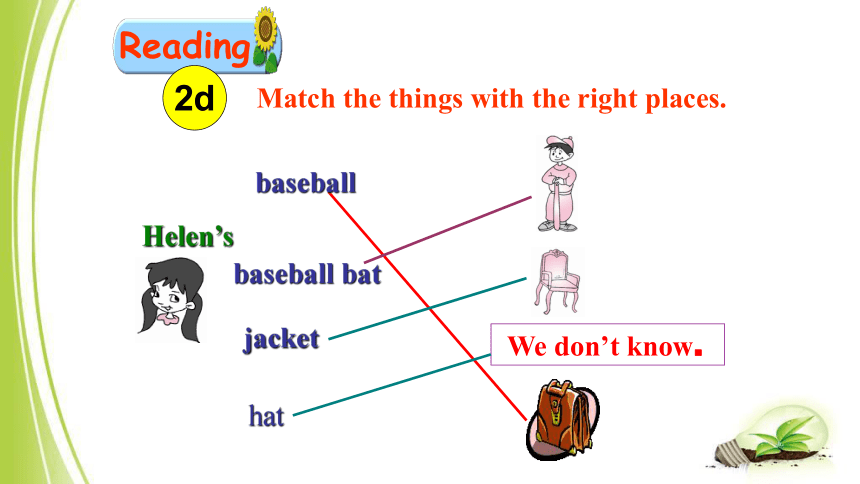
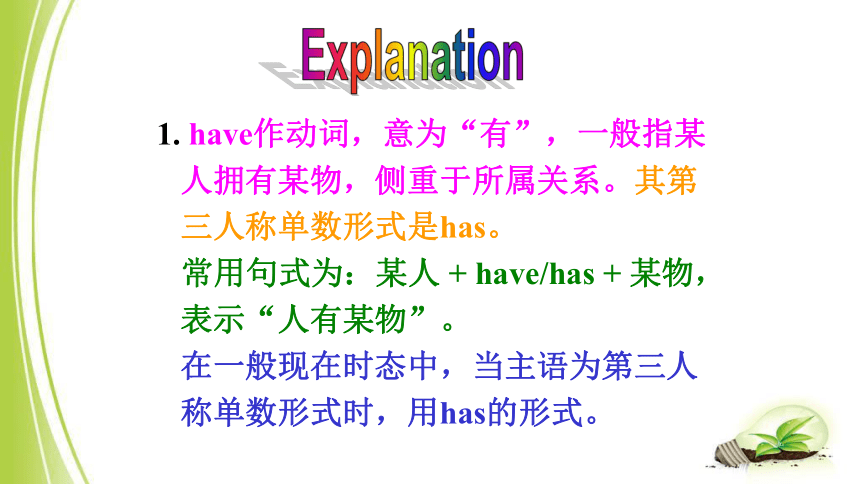
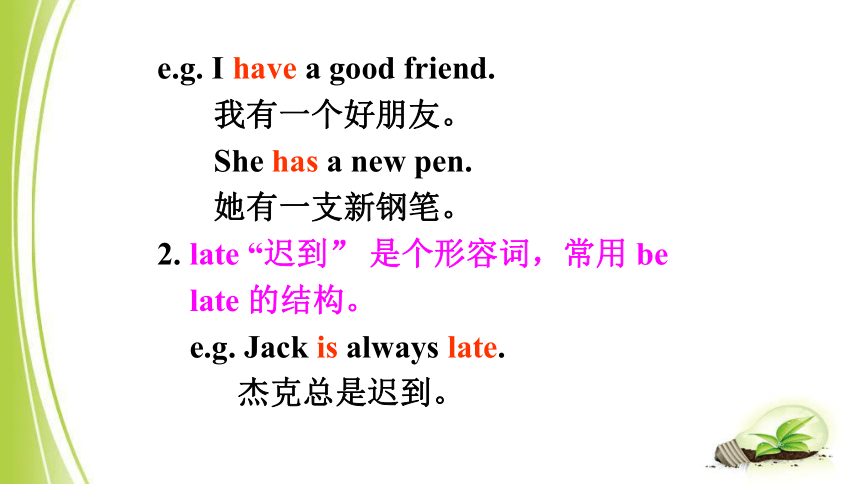
文档简介
(共29张PPT)
Unit
5
Section
A
2d-3c
let
us
(缩写)
_______
do
not
(缩写)
_______
3.
have
(第三人称单数形式)
_______
4.
we
(宾格)
_______
5.
on
(反义词)
_______
6.
we
(形容词性物主代词)
_______
7.
乒乓球拍
_____________
don’t
has
under
let’s
按要求写出正确的单词或句子。
us
our
ping-pong
bat
课前测评
8.
棒球拍
__________
9.
让我们走吧。
___________
10.
我们迟到了。
___________
11.
让我去拿它。
_____________
12.
贝尔有个排球。
__________________
Let’s
go.
We’re
late.
baseball
bat
Let
me
get
it.
Bill
has
a
volleyball.
Review
Does
…
have
a
______?
Yes,
…
No,
…
Dale
Paul
Mike
Cindy:
Hey,
Helen,
let’s
go!
We’re
late.
Helen:
OK.
Cindy:
Do
you
have
the
baseball?
Helen:
Yes,
I
do.
It’s
in
my
bag.
Cindy:
And
where’s
our
baseball
bat?
Helen:
Bill
has
it.
Cindy:
Oh,
yeah.
And
do
you
have
your
jacket?
Helen:
Oh,
no,
I
don’t.
It’s
on
the
chair.
Let
me
get
it.
Cindy:
And
your
hat,
too!
Helen:
OK,
I
have
my
jacket
and
hat.
Let’s
go.
Role-play
the
conversation.
2d
Reading
Match
the
things
with
the
right
places.
Helen’s
baseball
bat
baseball
jacket
hat
We
don’t
know.
2d
1.
have作动词,意为“有”,一般指某人拥有某物,侧重于所属关系。其第三人称单数形式是has。
常用句式为:某人
+
have/has
+
某物,表示“人有某物”。
在一般现在时态中,当主语为第三人称单数形式时,用has的形式。
Explanation
e.g.
I
have
a
good
friend.
我有一个好朋友。
She
has
a
new
pen.
她有一支新钢笔。
2.
late
“迟到”
是个形容词,常用
be
late
的结构。
e.g.
Jack
is
always
late.
杰克总是迟到。
3.
we是人称代词主格,意为“我们”,在句子中作主语。如:
We
are
good
friends.
我们是好朋友。
We
have
a
new
soccer
ball.
我们有一个新足球。
4.
us
“我们”,
是we的宾格形式,在句子
中放在介词或动词后作宾语。
【辨析】we
/
us
/
our
we
“我们”
是人称代词主格形式,作句子的主语。
us
“我们”是人称代词宾格形式,作句子的宾语。
our
“我们的”是形容词性物主代词,放在名词前。
e.g.
We
are
in
Mike’s
room.
我们在迈克的房间里。
Call
us
at
457-3287.
给我们打电话457-3287.
Our
teacher
is
in
the
classroom.
我们的老师在教室里。
5.
以动词let开头的祈使句,表示向别人提
建议,意思是“让……做……吧”。
基本结构为:let
sb.
do
sth.,表示
“让某
人做某事”,表示说话人的建议。其中sb.
可由名词或代词宾格来充当,其后的动
词一定要用动词原形。如:
Let
me
do
it.
让我来做吧。
Let
him
guess.
让他猜一猜。
6.
let’s是let
us
的缩写形式,意为“咱们一起做某事吧”,通常表示建议、请求或命令。
肯定回答:一般用“OK”,“All
right”,“Yes,
let’s
…”;
否定回答:一般用“Sorry,
I
…”
。如:
—
Let’s
go!
让我们走吧!
—
OK.
好吧。
Let’s
look
at
the
blackboard.
让我们看黑板。
I
they
he
she
it
Eric
you
we
I
he
they
you
we
she
it
Eric
Write
each
word
in
the
correct
place
in
the
chart.
do
does
I,
they,you,we
he,she,
it,
Eric
3a
Fill
in
the
blanks
with
do
or
does.
Then
practice
the
conversations
with
your
partner.
A:
you
have
a
baseball?
B:
Yes,
I
.
A:
Great!
I
have
a
bat.
Let’s
play!
Conversation
1
Do
do
3b
A:
John
have
a
soccer
ball?
B:
No,
he
.
A:
he
have
a
ping-pong
bat?
B:
Yes,
he
.
I
think
he
has
a
ping-pong
ball,
too.
A:
Hmm…let’s
ask.
Conversation
2
Does
doesn’t
Does
does
A:
your
friends
have
a
basketball?
B:
Yes,
they
.
They
have
two
basketballs.
A:
Well,
let’s
play
basketball.
B:
That
sounds
good.
Conversation
3
Do
do
Remember
the
things
in
Bob’s
room.
Then
close
your
books
and
ask
and
answer
questions
with
a
partner.
A:
Does
Bob
have
a
soccer
ball?
B:
Yes,
he
does.
3c
句型“Do
you
have…?”
“表示你有……吗?”,用于询问物品的所属关系。这是实义动词的一般疑问句结构。
1.
当主语是第一人称/第二人称/第三人称复数时,
句型结构为:Do
+
you/they/we/…
+
动词原形
+
…?
不管用什么动词,它的回答是固定的。
肯定回答:
Yes,
I
do./
Yes,
we
do.
/
Yes,
they
do.
否定回答:
No,
I
don’t
/we
don’t.
/No,
they
don’t.
e.g.
—
Do
they
like
basketball?
他们喜欢打篮球吗?
—
Yes,
they
do.
是的,他们喜欢。
—
No,
they
don’t.
不,他们不喜欢。
2.
当主语为第三人称单数时,句子结构改为:
Does
+
he
/
she
/
it
…
+
动词原形
+
…?
肯定回答:Yes,
he
does./Yes,
she
does./Yes,
it
does.
否定回答:No,
he
doesn’t./No,
she
doesn’t
/
No,
it
doesn’t.
e.g.
—
Does
Jane
have
a
new
book?
简有一本新书吗?
—
Yes,
she
does.
是的,她有。
—
No,
she
doesn’t.
不,她没有。
一、根据句意及汉语提示完成单词。
1.
Do
you
have
a
_________
(棒球)?
2.
Jim
_______
(有)
a
new
ping-pong
ball.
3.
Let’s
_______
(打)
to
the
teachers’
room.
4.
Can
you
teach
_____
(我们)
English?
5.
That
________
(听起来)
great.
6.
Let’s
play
__________
(篮球)
with
Mike
and
Jack.
baseball
has
play
us
sounds
basketball
Exercises
7.
Don’t
be
_____
(迟到)
again,
Sun
Wei.
8.
Ms
Sun
is
a
_______
(伟大的)
teacher.
9.
My
sister
always
______
(玩耍)
with
our
lovely
cat.
10.
There
are
(有)
two
new
__________
(排球)
on
the
desk.
great
plays
volleyballs
late
二、句型转换
1.
Do
you
have
a
map?
(作肯定回答)
2.
Do
you
have
an
English
dictionary?
(作否定回答)
3.
Does
Linda
have
an
eraser?
(作肯定回答)
Yes,
I
do.
No,
I
don’t.
Yes,
she
does.
4.
Does
he
have
a
volleyball?
(作否定回答)
5.
I
have
a
nice
ping-pong
bat.
(用she来代替I)
______
_______
a
nice
ping-pong
bat.
No,
he
doesn’t.
She
has
6.
I
have
a
baseball
bat.
(改为一般疑问句)
_______
_______
_______
a
baseball
bat?
7.
My
brother
has
a
soccer
ball.
(改为一般疑问句)
_____
your
brother
______
a
soccer
ball?
8.
Do
your
friends
have
a
volleyball?
(作肯定回答)
_______,
_______
____.
9.
Does
Mr.
Smith
have
a
brother?
(作否定回答)
______,
_____
_______.
10.
My
hat
is
on
the
chair.
(对划线部分提问)
_______
______
_____
hat?
Do
you
have
Does
have
Yes
they
do
No
he
doesn’t
Where
is
my
1.
你有一只棒球拍吗?
_____
you
______
a
baseball
_____?
2.
埃里克有一个网球吗?
_____
Eric
______
a
_______
ball?
3.
戴尔有一个足球和一个排球。
Dale
_____
a
______
ball
and
a
___________.
4.
我有一个篮球和一个乒乓球拍。
I
_____
a
___________
and
a
ping
pong
____.
Do
have
Does
have
tennis
has
soccer
volleyball
have
basketball
bat
bat
三、
根据汉语提示完成句子。
空白演示
单击输入您的封面副标题
Unit
5
Section
A
2d-3c
let
us
(缩写)
_______
do
not
(缩写)
_______
3.
have
(第三人称单数形式)
_______
4.
we
(宾格)
_______
5.
on
(反义词)
_______
6.
we
(形容词性物主代词)
_______
7.
乒乓球拍
_____________
don’t
has
under
let’s
按要求写出正确的单词或句子。
us
our
ping-pong
bat
课前测评
8.
棒球拍
__________
9.
让我们走吧。
___________
10.
我们迟到了。
___________
11.
让我去拿它。
_____________
12.
贝尔有个排球。
__________________
Let’s
go.
We’re
late.
baseball
bat
Let
me
get
it.
Bill
has
a
volleyball.
Review
Does
…
have
a
______?
Yes,
…
No,
…
Dale
Paul
Mike
Cindy:
Hey,
Helen,
let’s
go!
We’re
late.
Helen:
OK.
Cindy:
Do
you
have
the
baseball?
Helen:
Yes,
I
do.
It’s
in
my
bag.
Cindy:
And
where’s
our
baseball
bat?
Helen:
Bill
has
it.
Cindy:
Oh,
yeah.
And
do
you
have
your
jacket?
Helen:
Oh,
no,
I
don’t.
It’s
on
the
chair.
Let
me
get
it.
Cindy:
And
your
hat,
too!
Helen:
OK,
I
have
my
jacket
and
hat.
Let’s
go.
Role-play
the
conversation.
2d
Reading
Match
the
things
with
the
right
places.
Helen’s
baseball
bat
baseball
jacket
hat
We
don’t
know.
2d
1.
have作动词,意为“有”,一般指某人拥有某物,侧重于所属关系。其第三人称单数形式是has。
常用句式为:某人
+
have/has
+
某物,表示“人有某物”。
在一般现在时态中,当主语为第三人称单数形式时,用has的形式。
Explanation
e.g.
I
have
a
good
friend.
我有一个好朋友。
She
has
a
new
pen.
她有一支新钢笔。
2.
late
“迟到”
是个形容词,常用
be
late
的结构。
e.g.
Jack
is
always
late.
杰克总是迟到。
3.
we是人称代词主格,意为“我们”,在句子中作主语。如:
We
are
good
friends.
我们是好朋友。
We
have
a
new
soccer
ball.
我们有一个新足球。
4.
us
“我们”,
是we的宾格形式,在句子
中放在介词或动词后作宾语。
【辨析】we
/
us
/
our
we
“我们”
是人称代词主格形式,作句子的主语。
us
“我们”是人称代词宾格形式,作句子的宾语。
our
“我们的”是形容词性物主代词,放在名词前。
e.g.
We
are
in
Mike’s
room.
我们在迈克的房间里。
Call
us
at
457-3287.
给我们打电话457-3287.
Our
teacher
is
in
the
classroom.
我们的老师在教室里。
5.
以动词let开头的祈使句,表示向别人提
建议,意思是“让……做……吧”。
基本结构为:let
sb.
do
sth.,表示
“让某
人做某事”,表示说话人的建议。其中sb.
可由名词或代词宾格来充当,其后的动
词一定要用动词原形。如:
Let
me
do
it.
让我来做吧。
Let
him
guess.
让他猜一猜。
6.
let’s是let
us
的缩写形式,意为“咱们一起做某事吧”,通常表示建议、请求或命令。
肯定回答:一般用“OK”,“All
right”,“Yes,
let’s
…”;
否定回答:一般用“Sorry,
I
…”
。如:
—
Let’s
go!
让我们走吧!
—
OK.
好吧。
Let’s
look
at
the
blackboard.
让我们看黑板。
I
they
he
she
it
Eric
you
we
I
he
they
you
we
she
it
Eric
Write
each
word
in
the
correct
place
in
the
chart.
do
does
I,
they,you,we
he,she,
it,
Eric
3a
Fill
in
the
blanks
with
do
or
does.
Then
practice
the
conversations
with
your
partner.
A:
you
have
a
baseball?
B:
Yes,
I
.
A:
Great!
I
have
a
bat.
Let’s
play!
Conversation
1
Do
do
3b
A:
John
have
a
soccer
ball?
B:
No,
he
.
A:
he
have
a
ping-pong
bat?
B:
Yes,
he
.
I
think
he
has
a
ping-pong
ball,
too.
A:
Hmm…let’s
ask.
Conversation
2
Does
doesn’t
Does
does
A:
your
friends
have
a
basketball?
B:
Yes,
they
.
They
have
two
basketballs.
A:
Well,
let’s
play
basketball.
B:
That
sounds
good.
Conversation
3
Do
do
Remember
the
things
in
Bob’s
room.
Then
close
your
books
and
ask
and
answer
questions
with
a
partner.
A:
Does
Bob
have
a
soccer
ball?
B:
Yes,
he
does.
3c
句型“Do
you
have…?”
“表示你有……吗?”,用于询问物品的所属关系。这是实义动词的一般疑问句结构。
1.
当主语是第一人称/第二人称/第三人称复数时,
句型结构为:Do
+
you/they/we/…
+
动词原形
+
…?
不管用什么动词,它的回答是固定的。
肯定回答:
Yes,
I
do./
Yes,
we
do.
/
Yes,
they
do.
否定回答:
No,
I
don’t
/we
don’t.
/No,
they
don’t.
e.g.
—
Do
they
like
basketball?
他们喜欢打篮球吗?
—
Yes,
they
do.
是的,他们喜欢。
—
No,
they
don’t.
不,他们不喜欢。
2.
当主语为第三人称单数时,句子结构改为:
Does
+
he
/
she
/
it
…
+
动词原形
+
…?
肯定回答:Yes,
he
does./Yes,
she
does./Yes,
it
does.
否定回答:No,
he
doesn’t./No,
she
doesn’t
/
No,
it
doesn’t.
e.g.
—
Does
Jane
have
a
new
book?
简有一本新书吗?
—
Yes,
she
does.
是的,她有。
—
No,
she
doesn’t.
不,她没有。
一、根据句意及汉语提示完成单词。
1.
Do
you
have
a
_________
(棒球)?
2.
Jim
_______
(有)
a
new
ping-pong
ball.
3.
Let’s
_______
(打)
to
the
teachers’
room.
4.
Can
you
teach
_____
(我们)
English?
5.
That
________
(听起来)
great.
6.
Let’s
play
__________
(篮球)
with
Mike
and
Jack.
baseball
has
play
us
sounds
basketball
Exercises
7.
Don’t
be
_____
(迟到)
again,
Sun
Wei.
8.
Ms
Sun
is
a
_______
(伟大的)
teacher.
9.
My
sister
always
______
(玩耍)
with
our
lovely
cat.
10.
There
are
(有)
two
new
__________
(排球)
on
the
desk.
great
plays
volleyballs
late
二、句型转换
1.
Do
you
have
a
map?
(作肯定回答)
2.
Do
you
have
an
English
dictionary?
(作否定回答)
3.
Does
Linda
have
an
eraser?
(作肯定回答)
Yes,
I
do.
No,
I
don’t.
Yes,
she
does.
4.
Does
he
have
a
volleyball?
(作否定回答)
5.
I
have
a
nice
ping-pong
bat.
(用she来代替I)
______
_______
a
nice
ping-pong
bat.
No,
he
doesn’t.
She
has
6.
I
have
a
baseball
bat.
(改为一般疑问句)
_______
_______
_______
a
baseball
bat?
7.
My
brother
has
a
soccer
ball.
(改为一般疑问句)
_____
your
brother
______
a
soccer
ball?
8.
Do
your
friends
have
a
volleyball?
(作肯定回答)
_______,
_______
____.
9.
Does
Mr.
Smith
have
a
brother?
(作否定回答)
______,
_____
_______.
10.
My
hat
is
on
the
chair.
(对划线部分提问)
_______
______
_____
hat?
Do
you
have
Does
have
Yes
they
do
No
he
doesn’t
Where
is
my
1.
你有一只棒球拍吗?
_____
you
______
a
baseball
_____?
2.
埃里克有一个网球吗?
_____
Eric
______
a
_______
ball?
3.
戴尔有一个足球和一个排球。
Dale
_____
a
______
ball
and
a
___________.
4.
我有一个篮球和一个乒乓球拍。
I
_____
a
___________
and
a
ping
pong
____.
Do
have
Does
have
tennis
has
soccer
volleyball
have
basketball
bat
bat
三、
根据汉语提示完成句子。
空白演示
单击输入您的封面副标题
同课章节目录
- starters 预备篇(2012秋审查)
- Unit 1 Good morning !
- Unit 2 What’s this in English?
- Unit 3 What color is it ?
- Unit 1 My name's Gina.
- Section A
- Section B
- Unit 2 This is my sister.
- Section A
- Section B
- Unit 3 Is this your pencil?
- Section A
- Section B
- Unit 4 Where's my schoolbag?
- Section A
- Section B
- Unit 5 Do you have a soccer ball?
- Section A
- Section B
- Unit 6 Do you like bananas?
- Section A
- Section B
- Unit 7 How much are these socks?
- Section A
- Section B
- Unit 8 When is your birthday?
- Section A
- Section B
- Unit 9 My favorite subject is science.
- Section A
- Section B
